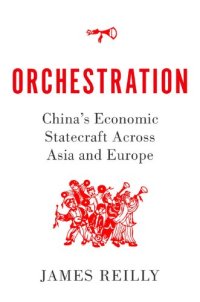
Ebook: Orchestration: China's Economic Statecraft Across Asia and Europe
Author: James Reilly
- Year: 2021
- Publisher: Oxford University Press
- Edition: 1
- Language: English
- pdf
The Chinese government has more control over more wealth than any other government in world history. With the Communist Party controlling the "commanding heights" of the world's second-largest economy, China appears ideally structured to pursue economic statecraft, using economic resources to advance its foreign policy goals. Yet as this book shows, domestic complications frequently constrain Chinese leaders. They have responded with a distinctive approach to economic statecraft: orchestration. Drawing upon extensive field research across Asia and Europe, Orchestration traces the origins, operations, and effectiveness of China's economic statecraft.
In this book, James Reilly examines the ideas and institutions at the heart of China's approach to economic statecraft, and assesses Beijing's orchestration in four cases: Myanmar, North Korea, Western Europe, and Central/Eastern Europe. China's unique experience as a planned economy, and then a developmental state, all under a single Leninist party, left Chinese leaders with unchallenged authority over their economy. However, despite successfully mobilizing companies, banks, and local officials to rapidly expand trade and investment abroad, Chinese leaders largely failed to influence key policy decisions overseas. For countries around the world, economic engagement with China thus yields more benefits with fewer costs than generally assumed.
Orchestration engages three central questions. First, why does China deploy economic statecraft in this particular fashion? Secondly, when is China's economic statecraft most effective? Finally, what can the China case tell us about economic statecraft more broadly? The findings show how China uses economic resources to exert influence abroad and identify when Beijing is most effective. By exploring the domestic drivers of China's economic statecraft, this book helps launch a new research field: the comparative study of economic statecraft.
In this book, James Reilly examines the ideas and institutions at the heart of China's approach to economic statecraft, and assesses Beijing's orchestration in four cases: Myanmar, North Korea, Western Europe, and Central/Eastern Europe. China's unique experience as a planned economy, and then a developmental state, all under a single Leninist party, left Chinese leaders with unchallenged authority over their economy. However, despite successfully mobilizing companies, banks, and local officials to rapidly expand trade and investment abroad, Chinese leaders largely failed to influence key policy decisions overseas. For countries around the world, economic engagement with China thus yields more benefits with fewer costs than generally assumed.
Orchestration engages three central questions. First, why does China deploy economic statecraft in this particular fashion? Secondly, when is China's economic statecraft most effective? Finally, what can the China case tell us about economic statecraft more broadly? The findings show how China uses economic resources to exert influence abroad and identify when Beijing is most effective. By exploring the domestic drivers of China's economic statecraft, this book helps launch a new research field: the comparative study of economic statecraft.
Download the book Orchestration: China's Economic Statecraft Across Asia and Europe for free or read online
Continue reading on any device:

Last viewed books
Related books
{related-news}
Comments (0)